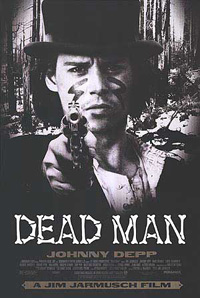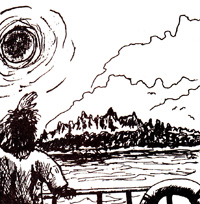 Dead Man
Dead Man
with Johnny Depp, Gary Farmer, Iggy Pop, Crispin Glover
Written and Directed by Jim Jarmusch
by Kerry Joyce
Johnny Depp stars as William Blake (Get It?), a “stupid fucking white man” (our numbers remain legion), and more specifically, an accountant with an ax to wield, already whetted as it were, by the circumstances of outrageous misfortune; an ambivalent pilgrim whose passage takes him through the twilight days of the ol’ West.
If you are unfamiliar with the Western cowboy genre then you are either a microbe circling Jupiter or your mother was photographed buck naked and out of doors at some point by a National Geographic photographer.
This tale, in that grandiose tradition, is replete with all of the familiar elements of cowboy fable: a crowded saloon, a campfire bean supper, an Indian sage, a buffalo hunt, a small town capitalist oligarch, a damsel in distress, the railroad, a score or more Quick Draw McGraws, and of course, a reluctant gun slinger accused of a crime he didn’t commit.
Verily, this movie leaves no Western cliché unturned, one rifle pointing hombre even threatens our hero (Depp) with “(you’ll be) pushing up daisies from a pine box.”
On another level, as we are fond of saying in the New York Times Sunday Book Review supplement, Dead Man is a sort of Dances With Wolves of the lettered classes. The kind of fil-um that gets the candy butts over at Harper’s and the Atlantic Monthly kowtowing to the point where their bowties touch their worshipfully shaking knees, rich as it is in the (for some) vertigo inducing ingredients of allegory, metaphor, foreshadowing, and other literary nutrients of the sort that keep pure-hearted school marms from ingesting psychoactive mushrooms or taking up bungee jumping on the weekends.
The story opens, eerily enough, with Crispin Glover stoking the railroad furnace, then sitting down for a foreboding little chit-chat with Depp, after the manner of Charon of Greek mythology conveying a paying customer across the river Styx. But even if that allegorical artifice, or even the black spot in the unmistakable shape of a hand ominously splayed on a Pinto’s rump doesn’t get you all a-hankerin’ to shoot one arm up in the air, and scream: “Ooh, Mr. Kotter!” or inspire you to make up your own pretend essay tests some dreary, rain-soaked afternoon, Dead Man might still be for you.
This is a product of Hollywood after all, a land where just because somebody is brainy, you assume that they are foolish besides, only at your peril.
So Dead Man engagingly warps each mundane Western movie cliché, usually with a comedic twist, all nicely spliced with jolting juxtapositions of violence and the grotesque, a technique popularized in the 1968 movie Bonnie and Clyde and perfected by Quentin Tarantino in this here decade.
The campfire bean supper scene, for instance, features Iggy Pop in the homespun gingham garb of an Amish drag queen, and then: The shoot-out (not the first, nor nearly the last).
Even the geographical elements are mercilessly twisted. The forests and actual injuns of the Pacific Northwest replace the familiar desert and Mexicans-dressed-as-Plains-Indians of the American Southwest, of which we are all too familiar.
The small town and indigenous village squalor portrayed in Dead Man is, not-so-comedically, more evocative of Oliver Twist’s London than the goodly bustle of Ben Cartwright’s Virginia City, as the name of the town’s chief employer, “Dickenson Metal,” not so subtly reminds.
For good or ill, an era’s “civilization” is a conspiracy between nearly all of its women and a handful of its powerful men, and Depp, the earnest would-be accountant, the bespectacled bean counter, is the symbolic embodiment of cultural refinement, as much leading woman as he is leading man. With a paper rose in his lapel and hair that’s “soft like a girl’s,” Depp is our modern age Phaedrus allowing the straight boys in the crowd to get in touch with their inner queer somewhat without having to consciously make a disturbing or compromising effort. The ladies, of course, are enthralled. But while his dead-on accuracy with a handgun has a mystical quality, Depp fires only in self-defense, and like any good damsel, is more the catalyst of the morality play that surrounds him than an active participant.
Early on, one cowgirl, who Depp saves from the evil clutches of a mud puddle, throws herself between Depp and a bullet fired by her jealous ex-lover, during some post-coital pillow talk, dying in the process.
The ex then stands as if stupefied in the doorway as Depp,who damselly cowered with his eyes peeping over the bed sheets only a moment earlier, turns manly suddenly and fires three times before fatally striking his mark with the dead gal’s chamber pistol.
Possessed of only the perverse rudiments of, or outright resistance to, our great culture, the white savages, whose lust and avarice drive them to stake their claim and subdue the untamed wilderness, are largely powerless and tamed in turn when confronted by sissified big-city dandies like Depp, who is merely the first of many more to follow: The bankers, lawyers, administrators, poets, etc. who arrive once matters are sufficiently cozy for them to receive their well-deserved tribute from the coarse, ill-bred wretches who made it all possible. Delirium is a time-honored dramatic device which can allow a story to dance in and out of reality with flourishes of the supernatural. The altered state of Depp’s character, resulting from his grave wounds throughout, are either under-utilized or admirably restrained by writer/director Jim Jarmusch. You be the judge.
Not surprisingly, given the strength of the script and Jarmusch’s reputation as a director, Dead Man managed to assemble a star-embroidered cast with a number of the most hallowed names in the acting profession weighing in for cameo roles: Billy Bob Thornton, Gabriel Byrne, Robert Mitchum, and John Hurt, as well as legendary bad guys Michael Wincott (The Crow) and Lance Henriksen (Mansion Of The Doomed, Aliens, Nightmares, Near Dark, Hitlist, Excessive Force… you get the idea).
The soundtrack, written and performed by Neil Young, typifies the kind of music he was born to do, as opposed to that which he has been most fond of making for the past couple of decades.
Dead Man could be the great American novel, ’90s style. But then “the eagle never lost so much time as when he submitted to learn from the crow.”


